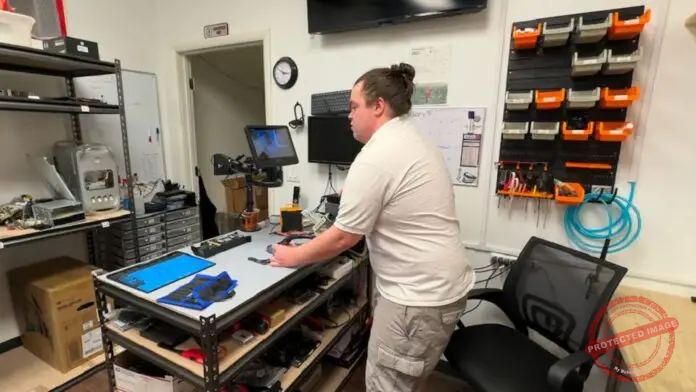WEST SENECA, N.Y. — Before the new year, the New York State Digital Fair Repair Act went into effect. If you’re asking whether that has made a difference, you’re not alone.
Recently, New York Attorney General Letitia James has put out a reminder on a first-in-the-nation law. There seems to be a lot of red tape, confusion and frustration, though, among repair shops. That includes PC Plug in West Seneca. The pandemic-era basement startup has a much larger processing center now.
The independent repair shop was the target of the New York State Digital Fair Repair Act. It was supposed to help get the schematics, for example, into PC Plug Co-Owner/Operator Garrett Dulak’s hands, to make repairs quicker and less expensive.
“There were really good intentions in getting the bills started,” Dulak said, before adding, “This is a like a $2,000 graphics card. There are no repair services for this card. You can’t get schematics. You can’t get parts for it.”
The part he needs is just 40 cents.
“They claim a lot of these components are unsafe to work on, or if you replace it with the wrong one, your data could be insecure,” Dulak said. “That’s not fair.”
Manufacturers don’t have to give out components that may pose a heightened safety risk if installed improperly or special documentation tools, and parts that would disable or override anti-theft security measures. But Dulak believes manufacturers are taking advantage of the language set forth.
“Every company has got their IP,” Dulak said. “They don’t want anybody knowing about it. They make a lot more money off a $2,000 replacement than a $5 repair part.”
Another goal of this law is to help cut down on e-waste, which New York already has programs for.
“It’s collected nearly 100 million pounds per year,” said Peter van Erp, environmental program specialist with the DEC.
It’s the DEC’s New York State Electronic Equipment Recycling Re-use program. E-waste has toxins that can harm the environment.
Did you know there’s a state law that makes it illegal to dump electronics?
“Effective in 2015, no one can actually throw what’s termed covered electronic equipment in for disposal in the landfill, or in the trash,” van Erp explained.
Van Erp says manufacturers are also required to have a network of collection sites and a weight they must collect annually. There are 500 sites across the state. Once collected, some items are refurbished, and others get broken down and reused.
Back at PC Plug, there’s no shortage of computers that need a little TLC, as well as e-waste. Dulak is hopeful one day they can truly help his clients with more affordable solutions.
“A full federal scale regulation on tech manufacturers to actually force them to provide components that would be fantastic,” Dulak said.
Spectrum News 1 reached out to the AG’s office to address the issues PC Plug is facing. A spokesperson directed us to a link for them to file a complaint.
New York’s right-to-repair legislation was the first of its kind. It still is — and isn’t. According to the National Conference of State Legislatures, 33 states and Puerto Rico considered the right-to-repair legislation during the 2023 legislative session. Four enacted right-to-repair legislation.
Colorado requires agricultural equipment manufacturers to provide resources for folks. California and Minnesota have right-to-repairs that go into effect this coming summer.
Post Disclaimer
The information provided in our posts or blogs are for educational and informative purposes only. We do not guarantee the accuracy, completeness or suitability of the information. We do not provide financial or investment advice. Readers should always seek professional advice before making any financial or investment decisions based on the information provided in our content. We will not be held responsible for any losses, damages or consequences that may arise from relying on the information provided in our content.





 AMD
AMD TMC
TMC IE
IE MSI
MSI NOK
NOK DELL
DELL ECDH26.CME
ECDH26.CME